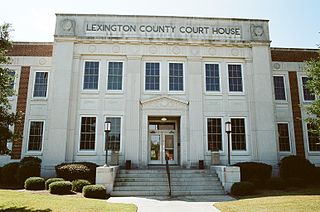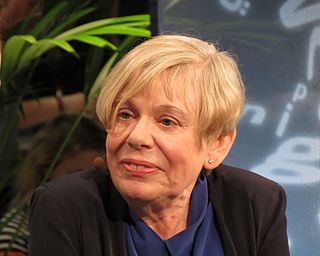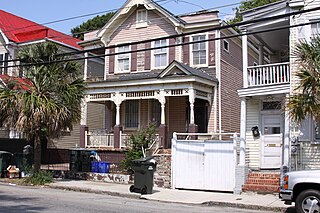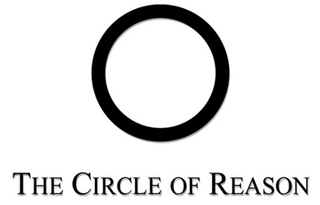
Religious humanism or ethical humanism is an integration of nontheistic humanist ethical philosophy with congregational rites and community activity which center on human needs, interests, and abilities. Self-described religious humanists differ from secular humanists mainly in that they regard the nontheistic humanist life stance as a non-supernatural "religion" and organising using a congregational model.

Lexington County is a county located in the U.S. state of South Carolina. As of the 2020 census, the population was 293,991. Its county seat and largest community is Lexington. The county was chartered in 1785 and was named in commemoration of Lexington, Massachusetts, the site of the Battle of Lexington in the American Revolutionary War. Lexington County is the sixth-most populous county in South Carolina by population and is part of the Columbia, SC Metropolitan Statistical Area. It is located in the Midlands region of South Carolina.

Aiken County is a county in the U.S. state of South Carolina. As of the 2020 census, its population was 168,808. Its county seat and largest community is Aiken. Aiken County is a part of the Augusta-Richmond County, GA-SC Metropolitan Statistical Area. It is mostly in the Sandhills region, with the northern parts reaching in the Piedmont and southern parts reaching into the Coastal Plain.

Aiken is the most populous city in, and the county seat of, Aiken County, South Carolina, United States. According to 2020 census, the population was 32,025, making it the 15th-most populous city in South Carolina and one of the two largest cities of the Central Savannah River Area.

Interfaith dialogue refers to cooperative, constructive, and positive interaction between people of different religious traditions and/or spiritual or humanistic beliefs, at both the individual and institutional levels.

Karen Armstrong is a British author and commentator of Irish Catholic descent known for her books on comparative religion. A former Roman Catholic religious sister, she went from a conservative to a more liberal and mystical Christian faith. She attended St Anne's College, Oxford, while in the convent and majored in English. She left the convent in 1969. Her work focuses on commonalities of the major religions, such as the importance of compassion and the Golden Rule.
The SC Technical College System is a statewide network of 16 technical colleges in South Carolina.
The Miss South Carolina competition is the pageant that selects the representative for the state of South Carolina in the Miss America pageant. The pageant was first held in Myrtle Beach and moved to Greenville starting in 1958 and remained in that city until the 1990s. Spartanburg hosted the pageant in a few different venues until new leadership took over the organization and moved the pageant to Columbia, SC in 2011. The pageant was televised since the 1960s until the 1998 pageant. Televising was resumed with the 2000 pageant through 2006. The pageant returned to television in 2014.
The Temple of Understanding is an interfaith organization founded in 1960 by Juliet Hollister and located in New York City.

U.S. Route 78 (US 78) is a 142.207-mile (228.860 km) U.S. highway that travels from Memphis, Tennessee to Charleston, South Carolina. In the U.S. state of South Carolina, it travels from the Savannah River at North Augusta to its eastern terminus in Charleston; connecting the cities of Aiken, Summerville, and North Charleston.

The 2008 South Carolina Senate elections were held on Tuesday, November 4, 2008. The primary elections were held on June 10 and the runoff elections were held two weeks later on June 24. The current composition of the state delegation is 27 Republicans and 19 Democrats. Senators are elected for four-year terms, all in the same year.
Charter for Compassion is a document written in 2009 that urges the peoples and religions of the world to embrace the core value of compassion. The charter is currently available in more than 30 languages and has been endorsed by more than two million individuals.
Interfaith Youth Core (IFYC) is a Chicago-based non-profit founded in 2002 by Eboo Patel. In May 2022 it changed its name to Interfaith America. The organization’s stated mission is to make interfaith cooperation a social norm. Today it operates with approximately 30 full-time staff and a $4-million budget. It has worked on five continents and with over 200 college campuses domestically.
Jon Eliot Ramer is an American entrepreneur, civic leader, inventor, and musician. He is co-founder of several technology companies including Ramer and Associates, ELF Technologies, Inc.,(whose main solution, Serengeti, was purchased by Thomson Reuters) and Smart Channels. The designer and co-founder of several Deep Social Networks, he is the former executive director of the Interra Project, and a co-founder of Ideal Network, a group-buying social enterprise that donates a percentage of every purchase to a non-profit or school. Ideal Network is a certified B-Corp that was recognized as "Best in the World for Community" in 2012 by B-Labs. He is also the designer and co-founder of Compassionate Action Network International, a 501(c)(3) organization based in Seattle, that led the effort to make the city the first in the world to affirm Karen Armstrong's Charter for Compassion. Most recently, Ramer conceived of and produced the "Compassion Games: Survival of the Kindest" in response to a challenge from the mayor of Louisville, Kentucky to other cities to outdo Louisville's compassionate action as measured by hours of community service. Ramer also serves as Director and Chief Technology Officer at Four Worlds International Institute, with a focus on the Campaign To Protect the Sacred. The campaign birthed the International Treaty to Protect the Sacred from Tar Sands Projects, signed by over fifty different tribes throughout North America. Ramer is also the songwriter and lead guitarist in the band Once And For All.

The U.S. state of South Carolina is located in the Southern United States. It is the 23rd largest state by population, with a population of 5,024,369 according to 2017 United States Census estimates.

The Circle of Reason (TCOR) is a Twin Cities, Minnesota-based international society of theists, atheists, conservatives, and liberals who espouse the social philosophy of pluralistic rationalism.

The Baháʼí Faith in South Carolina begins in the transition from Jim Crow to the Civil Rights Movement but defines another approach to the problem, and proceeded according to its teachings. The first mention in relation to the history of the religion came in the 1860s in a newspaper article. Following this the first individual from South Carolina to find the religion was Louis Gregory in 1909, followed by individuals inside the state. Communities of Baháʼís were soon operating in North Augusta, Columbia and Greenville struggled with segregation culture through the 1950s externally and internally. However, in the 1969-1973 period, a very remarkable and somewhat unsustainable period of conversions to the religion on the basis of a meeting of Christian and Baháʼí religious ideas established a basis of community across several counties - notably Marion, Williamsburg, and Dillon, served by the Louis Gregory Institute and its radio station WLGI but also across the wider area. That community continues and has gathered news coverage as part of the second largest religion in South Carolina.
The Alliance for Shared Values (AfSV) is a New York-based 501(c)(3) nonprofit umbrella organization and major part of the Gülen movement, or Hizmet.











